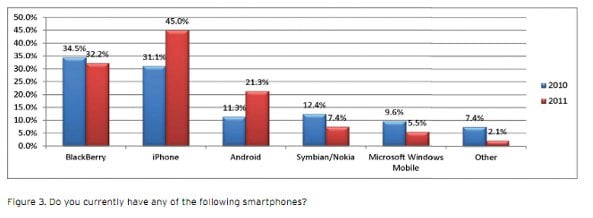The enterprise market, where BlackBerry has traditionally reigned supreme, is now ruled by the iPhone according to recent reseach. A survey by iPass questioned 2,300 employees across 1,100 businesses around the world, and showed that 32.2% owned a BlackBerry (compared to 34.5% last year), while 45.0% claimed to use an iPhone for work, compared to 31.1% in 2010. If that wasn’t enough, BlackBerry placed fourth among planned acquisitions for 2012, after Windows Mobile (?), Android, and iPhone. The tablet market isn’t much prettier. The BlackBerry PlayBook, often toted as “the first enterprise-ready tablet”, was only claimed by 6.2% of respondents, while 84.1% of mobile workers have or intend to have an iPad 2 in 2012.
RIM has been investing a lot in personal liable devices, that is, supporting phones that employees themselves bring in, rather than using company-issued ones. BlackBerry Balance enables IT administrators to feel confident that sensitive data isn’t accidentally finding its way out to the personal contacts of employees, and soon RIM will have enterprise server support for Android and iOS. Unfortunately, the iPass survey shows that personal liable adoption has only grown slightly in the last year – from 34% to 42%. While that’s a healthy chunk that RIM is in a good position to address (whether they’re bringing in a BlackBerry or not), it will take awhile before the vast majority of employees are bringing in their own phones. Even then, RIM may not even have a future in device management service; iPass said that 73% of businesses surveyed allowed unmanaged smartphones to access corporate resources.
While these figures look bleak, it’s worth noting that 49% of survey respondents were from North America, while RIM’s biggest growth lately has been just about everywhere else. With data like this, it’s clear that Apple has proven that appealing to consumer sensibilities first and businesses second has worked like a charm, and if RIM wants to keep up, their next-gen BBX platform will need to strike that tone.
[via ComputerWorld]
